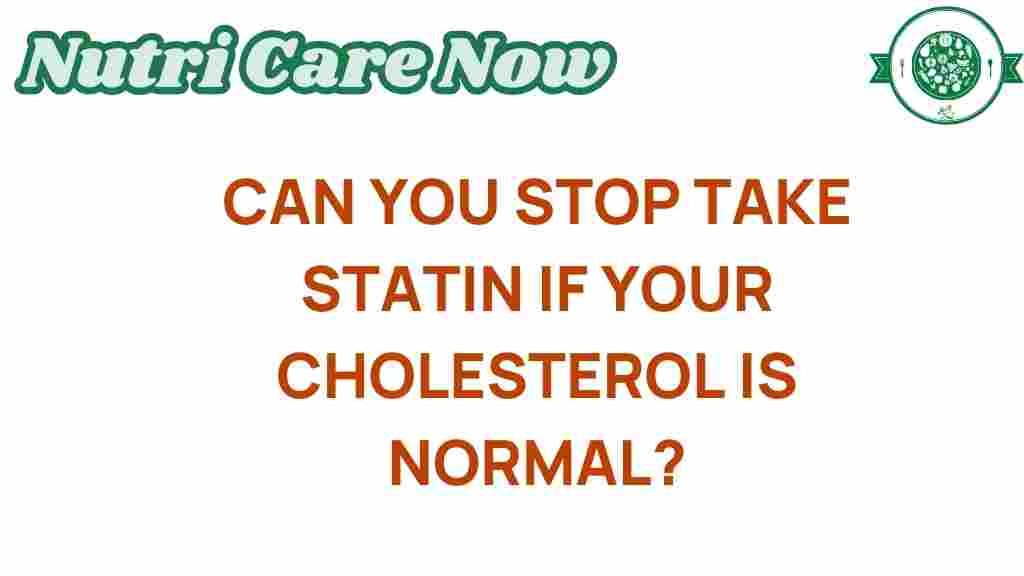The Surprising Truth: Can You Stop Taking Statins with Normal Cholesterol?
Statins are one of the most prescribed medications globally, used primarily to lower cholesterol levels and reduce the risk of cardiovascular diseases. However, many patients find themselves questioning whether they can stop taking statins if their cholesterol levels are deemed normal. This article will delve into the relationship between statins, cholesterol, heart health, and the myths surrounding them. We will also explore lifestyle changes and patient safety considerations in the context of healthcare.
Understanding Statins and Cholesterol
Before addressing the main question, it’s crucial to understand what statins are and how they affect cholesterol levels in the body. Statins are a class of drugs that inhibit the enzyme HMG-CoA reductase, which plays a central role in the production of cholesterol in the liver.
Cholesterol itself is a waxy substance found in your blood. It is essential for building cells and hormones, but when levels become too high, it can lead to the buildup of plaques in your arteries, increasing the risk of heart disease and stroke.
The Role of Statins in Heart Health
Statins are primarily prescribed to:
- Lower LDL (bad) cholesterol levels
- Raise HDL (good) cholesterol levels
- Reduce the risk of heart attacks and strokes
- Stabilize plaques in the arteries
While statins are effective in managing cholesterol levels, they are not without side effects and controversies. This leads to the critical question: if your cholesterol levels are normal, can you safely discontinue statin therapy?
Can You Stop Taking Statins with Normal Cholesterol?
The answer to this question is not straightforward and depends on several factors, including your overall health, the reason you were prescribed statins, and your individual risk factors for cardiovascular disease.
Step-by-Step Process to Evaluate Your Need for Statins
If you’re considering stopping statin medication due to normal cholesterol levels, follow this process:
1. Consult Your Healthcare Provider
Before making any changes to your medication regimen, it is essential to consult your healthcare provider. They can provide personalized advice based on your medical history and risk factors.
2. Assess Your Cardiovascular Risk
Your doctor will likely evaluate your cardiovascular risk using several criteria:
- Age
- Family history of heart disease
- Blood pressure levels
- Diabetes status
- Smoking status
- Current lifestyle habits (diet, exercise)
3. Review Cholesterol Test Results
Normal cholesterol levels do not always indicate that it’s safe to stop taking statins. Your doctor will consider:
- Your total cholesterol levels
- LDL and HDL levels
- Triglyceride levels
4. Explore Lifestyle Modifications
In some cases, making significant lifestyle changes can help manage cholesterol levels effectively without the need for medication. Consider the following:
- Diet: Adopt a heart-healthy diet rich in fruits, vegetables, whole grains, and healthy fats.
- Exercise: Aim for at least 150 minutes of moderate-intensity exercise each week.
- Weight Management: Maintain a healthy weight to help control cholesterol levels.
- Quit Smoking: If you smoke, seek resources to help you quit.
Myths Surrounding Statins and Cholesterol
There are several myths about statins that can lead to confusion. Here are some common misconceptions:
Myth 1: Statins Are Only for People with High Cholesterol
While statins are primarily used to manage high cholesterol, they may also be prescribed for individuals with a history of heart disease, even if their cholesterol levels are normal.
Myth 2: Stopping Statins Will Not Impact Heart Health
Discontinuing statins without medical advice can increase the risk of heart-related issues, especially in individuals with existing cardiovascular risk factors.
Myth 3: All Patients Experience Side Effects from Statins
While some individuals do experience side effects, many tolerate statins well. It’s essential to discuss any concerns with your healthcare provider.
Patient Safety Considerations
Patient safety is paramount when it comes to medication management. Here are some key points to keep in mind:
- Always consult with your healthcare provider before stopping any medication.
- Regular monitoring of cholesterol levels and cardiovascular health is essential.
- Be aware of any new symptoms that may arise after discontinuing medication.
Exploring Alternatives to Statins
If you and your healthcare provider decide that stopping statins is appropriate, consider these alternatives:
- Other Medications: There are different classes of cholesterol-lowering medications, such as ezetimibe or PCSK9 inhibitors.
- Supplements: Some supplements, like omega-3 fatty acids or red yeast rice, may help manage cholesterol levels but should be discussed with your doctor.
- Dietary Changes: Emphasizing foods that lower cholesterol can be a natural alternative.
Troubleshooting Tips for Managing Cholesterol
If you decide to stop taking statins or are looking to manage your cholesterol levels effectively, consider the following troubleshooting tips:
- Keep a Food Diary: Track your dietary intake to ensure you’re adhering to a heart-healthy diet.
- Regular Check-ups: Schedule regular check-ups with your healthcare provider to monitor your cholesterol and heart health.
- Stay Informed: Educate yourself about heart health and cholesterol management through reputable sources.
Conclusion
The decision to stop taking statins when your cholesterol levels are normal should never be taken lightly. While it may be tempting to discontinue medication, especially if you feel well, it is essential to consider your overall cardiovascular health and consult with your healthcare provider. Lifestyle changes can significantly impact your heart health, and maintaining a healthy lifestyle is crucial for anyone considering reducing or stopping their medication.
By understanding the role of statins, cholesterol, and heart health, you can make informed decisions that prioritize your well-being. For more information on heart health and cholesterol management, check out this comprehensive resource.
In the end, your health is your most valuable asset. Make choices that support your cardiovascular health while being mindful of the myths and facts surrounding statins and cholesterol.
This article is in the category Health and created by NutriCareNow Team
